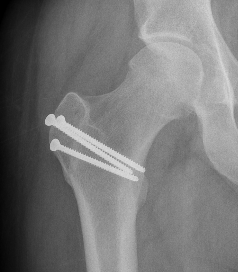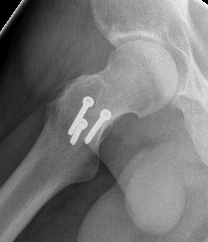Approaches
Anterior
Anterolateral
Lateral
Posterior
Medial
Anterior Approach / Smith Peterson
Indications
- neonatal hip sepsis
- open reduction hip DDH
Techique
Position
- supine
- sandbag under buttock
- free drape leg
Landmarks
- iliac crest to ASIS / superior limb
- ASIS to lateral patella / inferior limb
Incision
Anterior half crest to ASIS
- ASIS 10cm towards lateral patella
Bikini incision
- 2/3 lateral to ASIS and 1/3 medial
- 1-2cm below inguinal ligament
Superficial Dissection
- between Tensor Fascia Lata (SGN) and Sartorious (FN)
- ER leg to stretch sartorious
- find plane 2 inches below crest
- incise fascia over TFL to protect LFCN which runs over sartorius
- take TFL off crest
- divide ascending branch LCFA between the two muscles
Deep Dissection
- between RF and G. medius
- divide both heads of RF
- direct head to AIIS
- reflected head to acetabulum
- hip capsule is in base
Anterolateral Approach / Watson Jones
Concept
- between TFL and G. medius
Indications
- ORIF displaced subcapital
- THR
Technique
Position
- floppy lateral, 45o up, radiolucent table
Incision
- longitudinal incision, anterior to GT
Dissection
- plane between TFL and G medius
- TFL anterior
- G medius posterior, sometimes detach some off GT
- find fatty tissue over capsule
- may have to elevate RF off anterior capsule
- open capsule
- flexing the hip 20-30o will detension tissues and make job much easier
Lateral Approach / Hardinge
Concept
- detach anterior 1/3 G. medius
Indication
- THR
- hemiarthroplasty
Technique
Incision
- 8cm incision parallel to anterior border of femur
- slightly anterior
Superficial dissection
- split ITB
Deep dissection
Find anterior border of G medius
- take off anterior third
- usually a fat plane underneath
- find G minimus and take off separately
- expose capsule
Capsulotomy
- T shaped for hemi / THR
- Z shaped for SUFE avoiding superior neck capsule
Posterior / Southern / Kocher Langenbeck Approach
Indication
- THR
- acetabular posterior wall ORIF
Technique
Position
- lateral
Incision
- curve skin incision
- distal limb is over axis of femur
- curve over tip GT towards PSIS
- many variations
- can perform oblique incision over GT towards PSIS
Superficial dissection
- divide fascia
- split G. max
- there is a communicating vessel between superior & inferior gluteal arteries that crosses this plane & will bleed
- can release G. max distally to increase exposure (leave 1.5cm stump on femur for reattachment)
- wipe fat off posterior short external rotators, identify sciatic nerve
Cruciate anastomosis
- branches are visible over the short external rotators
- inferior gluteal artery runs along lower edge of piriformis tendon
- MCFA runs along upper border of Quadratus (has run up between obturator externus and quadratus)
- ligate these vessels in THR
Deep dissection
- place homan lever under G medius and minimus to expose superior joint capsule
- piriformis can be seen and palpated
- tag piriformis / conjoint tendon / quadratus femoris with sutures
- release from GT
- take capsule in same layer
- reflect to protect sciatic nerve
Non arthroplasty case
- divide short external rotators 2cm from the insertion
- preserve the anastomosis of MCFA with the gluteal vessels
- don't divide quadratus femoris
Medial Approach / Ludloff
Concept
- between Longus and Gracilis
- between Brevis and Magnus
Indications
- DDH open reduction
Technique
Position
- supine
- hip flexion, abduction & ER (ipsilateral foot placed onto opposite knee)
- makes adductor longus very palpable / visible
Landmarks
- adductor longus and pubic tubercle
Incision
- longitudinal / transverse incision
- begin 3cm below pubic tubercle
- continue down over adductor longus
Superficial dissection
- between adductor longus and gracilis (both supplied by anterior division obturator nerve)
- longus is anterior to gracilis
Deep dissection
- between adductor brevis (anterior division) and magnus (posterior division)
- brevis is anterior to magnus
- adductor brevis is between the two divisions of the nerve
- lesser trochanter with psoas tendon superior aspect of wound
- MFCA is medial to psoas tendon
Dangers
- anterior branch Obturator nerve lies between longus & brevis
- posterior branch Obturator nerve lies between brevis & magnus
- medial femoral circumflex artery passes around medial side of the distal part of the psoas tendon between psoas & pectineus
Surgical hip dislocation
AO surgery reference surgical hip dislocation


